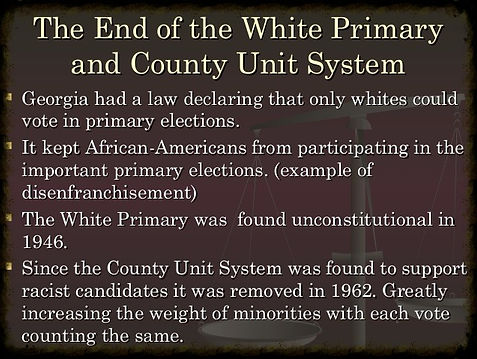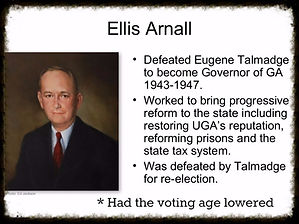
Unit 8 "The Modern Era"




1. Allen, Ivan (1911-2003) - mayor of Atlanta who was instrumental in the development of the city, bringing major league sports teams to Atlanta, and a key figure in the civil rights movement.
2. Hartsfield, William B. (1890-1971) - Atlanta’s longest serving mayor who was instrumental in bring aviation to the city and worked with civil rights leaders during the civil rights movement.
3. Jackson, Maynard (1938-2003) - first African-American mayor of a major southern city (Atlanta).
4. Arnall, Ellis (1907-1992) - progressive Georgia governor who is credited for restoring accreditation to the state’s institutions of higher education, lowering the voting age, and abolishing the poll tax.
5. Maddox, Lester (1915-2003)-one of the last openly segregationist politicians in Georgia (Governor).
6. Talmadge, Herman (1913-2002) - segregationist Georgia Governor and U.S. Senator; son of Governor Eugene Talmadge
7. Mays, Benjamin (1894-1984) - president of Morehouse College and mentor to Dr. Martin Luther King, Jr.
8. White Primary - tactic used by whites in Georgia to prevent blacks from voting in the Democratic primary; because Georgia was a one party state, this prevented African-Americans from having a voice in elections.
9. Brown v. Board of Education (1954) - Supreme Court cases that struck down the policy of separate but equal and mandated the desegregation of public schools.
10. King, Jr., Martin Luther (1929-1968) - important civil rights leader and winner of the Nobel Peace Prize.
11. 1956 State Flag - controversial flag that flew over Georgia from 1956-2001. The flag was controversial due to the flag’s prominent Confederate Battle emblem.
12. Student Non-Violent Coordinating Committee - civil rights organization by college students that urged non-violent protests to gain integration; the group became more militant in the late 1960s.
13. Sibley Commission (1961) - investigation by lawyer John Sibley to determine what should be done about integration in the state; though 60% of Georgians claimed they would rather close the public schools than integrate, Sibley recommended that public schools desegregate on a limited basis.
14. Holmes, Hamilton (1941-1995) - one of the first African-Americans to integrate the University of Georgia; became a successful doctor
15. Hunter (Gault), Charlayne (b. 1942) - one the first African-Americans to integrate the University of Georgia; became a successful journalist.
16. Albany Movement - an organized civil rights protest led by the Student Non-Violent Coordinating Committee, whose primary objective was to desegregate the city of Albany, Georgia, and the surrounding community.
17. March on Washington (1963) - famous civil rights march led by Dr. Martin Luther King, Jr.; the famous “I Have a Dream” speech was given at the march.
18. Civil Rights Act (1964) - federal legislation that forbade discrimination on the basis of race and sex in hiring, firing, and promotion.
19. Young, Andrew (b. 1932) - important civil rights leader who served as U.S. ambassador to the United Nations and Mayor of Atlanta; was also instrumental in bringing the 1996 Olympic Games to Atlanta.
20. Carter, Jimmy (b. 1924) - only United States President from Georgia; also a Georgia state senator and governor, and winner of the Nobel Peace Prize
21. Two Party System - a democratic form of government where two major parties dominate the political landscape.
22. 1996 Olympic Games - the Olympic Games are an international athletic event that occurs every four years; the 1996 Olympic Games were awarded to Atlanta and the state of Georgia; Georgia has benefited economically due to the games















